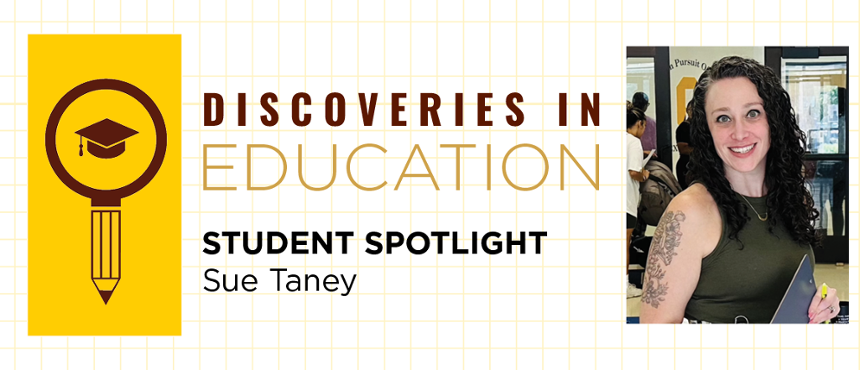Discoveries in Education Spotlight: Sue Taney
Discoveries in Education Spotlight: Sue Taney
Bridging Policy and Practice in Early Childhood Education
Shaping the Future of Early Learning in New Jersey
When it comes to improving early childhood education, few projects carry as much weight—or impact—as rewriting the standards that guide it. This summer, Rowan University Ed.D. candidate and alumna Sue Taney was one of just ten experts selected by the New Jersey Department of Education’s Division of Early Childhood Services to revise the New Jersey Preschool Teaching and Learning Standards—the first update since 2014.
“This important work focused on ensuring the revised standards are developmentally appropriate, grounded in current research, and responsive to the diverse needs, backgrounds, and exceptionalities of today’s learners,” Sue explains. “Contributing to this critical initiative has been a deeply meaningful professional milestone—and a point of personal pride.”
Equity, Inclusion, and Representation from the Start
For Sue, the motivation behind this work comes from nearly two decades in preschool classrooms—as a teacher, coach, and now supervisor. “I’ve seen how high-quality preschool experiences can shape a child’s academic and social trajectory,” she says, “but only when the learning environment reflects and responds to the diverse cultures, languages, and abilities of all children.”
Her goal was clear: to ensure the revised standards empower teachers to create classrooms where every child feels seen, valued, and capable of success.
A Confidence Boost and a Calling
While the process was rigorous, Sue says the greatest personal takeaway was simply being chosen for the role. “After nearly twenty years in preschool education, I wrestled with imposter syndrome,” she admits. “Being selected for this work was the confidence boost I didn’t know I needed—it affirmed that my experience and expertise are valued at the state level.”
The Impact on Teachers, Classrooms, and Communities
Sue hopes the updated standards make one message unmistakably clear: teachers must meet the needs of all learners, especially those who have been historically underserved—students with IEPs, multilingual learners, and children facing poverty or instability. “My hope is that the new standards provide practical, concrete guidance to help teachers better support every child in their classroom,” she says.
The ripple effect of this work, she explains, goes beyond classrooms. “Families and communities benefit when early learning programs are inclusive and culturally responsive. These environments strengthen family engagement and lay the foundation for long-term academic and social success.”
Leadership Through Collaboration
As both a district leader and Ed.D. candidate, Sue says the experience reaffirmed her belief that meaningful change requires shared ownership. “Successful initiatives rely on leaders who truly understand stakeholders’ needs and perspectives,” she says. “When people are invited into the decision-making process, they feel connected to the work—and more committed to implementing it.”
A New Era of Collaboration
Perhaps most importantly, Sue sees this project as a model for how state-level policy should be shaped going forward. “Many educators feel the NJDOE doesn’t always see the realities of the classroom,” she says. “This project felt like a deliberate effort to bridge that gap. Every contributor spoke openly about their staff and students’ needs—and the NJDOE listened. I hope that continues, so future policies truly reflect the conditions teachers face and support every child’s ability to thrive.”
